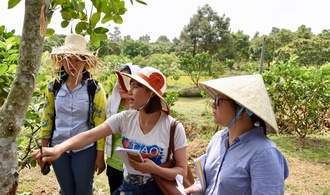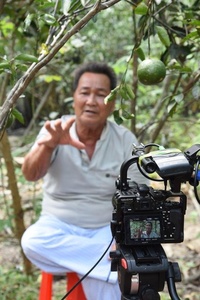Activities
Written by Modified on the
Results and deliverables of the ACP-ACTAE project
Writing a collective paper: “Towards Agroecological Crop Protection in Southeast Asia”
Exchanges that occured in the different actions of the ACP-ACTAE project allowed project partners to identify key phytosanitary issues considered as priorities. These were then declined, in a collective and participatory manner, as bases for collective reviews on “Crop Protection and perspectives”. Instead of designing a regional paper, the choice was made to design two national papers: one in Vietnam and the other in Myanmar. For each country, the paper structure and contributing authors were defined. This work is in progress in 2018. The structures of the collective Vietnamese and Birman papers are given in the minutes of the Hanoi and Nay Pyi Taw ACP Workshops held in April and May 2017.
Implementation of brochures and flyers on ACP
The first step of the second axis of the project aimed at designing and implementing brochures and flyers on ACP, in English and in national languages. The information targeted researchers, extenders, donors, and more generally stakeholders who want to know what Agroecology and ACP are. Accordingly, the following deliverables have been designed, written and edited:
- 1 brochure on Agroecological Crop Protection in Southeast Asia (4 pages, in English, Vietnamese, Burmese, Kmer and Lao)
- 2 flyers on Main Fruit Flies in Vietnam (1 page, in English and Vitenamese): Zeugodacus cucurbitae and Bactrocera dorsalis
- 5 posters on conservation biological control (1 page, in English and Vietnamese)
Please, be patient, PDFs may take a few seconds to open.
- 1 poster on beneficials (1 page, in English and Vietnamese)
Organization of 3 regional workshops: exchange of information and training
Two national and one regional workshops helped partners reach the same level of understanding, both on the current working research axes in Crop Protection and on the knowledge of ACP and its ins and outs.
- National workshop in Hanoi (Vietnam, 25-26 April, 2017), 24 participants, 15 organizations
- National workshop in Nay Pyi Taw (Myanmar, 3-5 May, 2017), 40 participants, 5 organizations
- Regional workshop in My Tho (Vietnam, 29-31, August 2017), 36 participants, 20 organizations
These workshops encompassed training sessions on ACP (What is ACP? What are the experiences available? What are the keys of the agroecological transition?), exchange of information on the status of Crop Protection regional priorities and local research axis, field trips and visits, discussion on the progress of a collective paper (action 1 above) and contribution to the identification of future orientations and area of work for further collaboration (action 5 below). These workshops also provided information to help identify candidates as participants of the International Scientist School (action 4).
The workshops were performed jointly by local partners (VAAS and NOMAFSI in Hanoi, MOALI in Nay Pyi Taw and SOFRI in My Tho) and by the Cirad. Training material was prepared and distributed to participants and was the basis for designing the ACP brochure (see Action 2) and a transfer assistance tool for field workers.
The contents of the workshops were: Background; Agroecological Crop Protection; ACP-ACTAE project and Workshop relevance; Program of the Workshop (with plenary session, working groups, field trip); Organization Committee; Participants and institutions; List of institutions; Structure and progress of the ACP-ACTAE project; Presentations; Annexes. After each workshop, a USB key was delivered to each participant, containing all the presentation files and some photos.
The minutes of the workshops were published and sent to all the participants.
- Deguine J.-P., 2017. Minutes of the ACP-ACPTAE Workshop. Hanoi, Vietnam, 25-26 April 2017, 44 pp.
- Deguine J.-P., 2017. Minutes of the ACP-ACPTAE Workshop. Nay Pyi Taw, Myanmar, 3-4 May 2017, 42 pp.
- Deguine J.-P., 2017. Minutes of the International ACP-ACPTAE Workshop. My Tho, Vietnam, 29-31 August 2017, 16 pp.
Organization of an ACP International Scientist School
In February 2018, an International Scientist School (ISS) was organized in Europe (Italy) on Agroecological Crop Protection (ACP). It was jointly organized by INRA (JN Aubertot), Cirad (JP Deguine) and Scuola Superiore Sant’Anna, Pisa (Camilla Moonen), under the umbrella of the ENDURE European network in Crop Protection. Participants from 10 countries, including PhD students as well as postdocs, junior and senior researchers working in Africa, Asia, South America, Central America and Europe, attended this ISS on ACP which ran from February 11th to 16th, 2018 ( see this event on the ENDURE website).
At the beginning of the ACP-ACTAE project, we had planned to organize a Twin International Scientist School on ACP, adapted to the context of Southeast Asia. Drawing inspiration from the ISS held in Voleterra (Italy), this Twin ISS was staged in Can Tho, Vietnam, in March 2018 (11-16), providing the opportunity for 33 participants to learn more about the ACP approach, which is seen as providing important benefits for crop protection in Southeast Asia.
The Can Tho ISS objectives were: (i) to better know and understand the concepts of ACP, methods and tools for their implementation and jointly exchange the principles of ACP; (ii) to engage participants in a collective dynamic of ACP and develop collaborations as well as research projects, with concrete deliverables, videos, articles, and training resources.
Co-organised by Cirad, Can Tho University and INRA, the five-day school was designed to offer participants a better knowledge and understanding of the concepts of ACP, introduce methods and tools for its implementation, enhance relationships between researchers from various disciplines (Soil Sciences/Phytopathology/Entomology), encourage discussions to create a collective ACP dynamic and develop collaborations as well as research projects with concrete deliverables, videos, articles and training resources.
The lecturers of the International Scientist School on ACP were: Dr Jean-Noël Aubertot (INRA, France), Dr Philippe Cao Van (Cirad, Laos), Dr Jean-Philippe Deguine (Cirad, Réunion), Dr Duong Minh Vien (CTU, Vietnam), Pr Le Van Vang (CTU, Vietnam), Dr Nguyen Thi Ngoc Truc (Sofri, Vietnam), Dr Pham Thi Sen (Nomafsi, Vietnam), Dr Philippe Tixier (Cirad, France), Dr Kris Wyckhuys (Asia Entomology, Vietnam/China). In addition, Dr Sen (Nomafsi) gave a presentation on Conservation Agriculture in Southeast Asia. 25 participants from different countries of South Eastasia and 8 lecturers attended this International Scientist School.
The school included lectures on ACP, explaining the principles and examples of its successful employment, lectures and group work on modelling, a field visit, an examination of ACP research topics and case studies (banana, rice and mango, for example) and a final day drawing conclusions. Some of the take-home messages from the participants included the fact that ACP can be applied in the future in the region, qualitative modelling is a very useful approach to consider ‘complexity’, interdisciplinarity will be necessary to develop ACP and soil health and biodiversity are the two main axes of ACP.
At the end of the ISS, a USB key was given to each participant, containing all the presentation files, a set of targeted publications and some photos.
The highlights of the ISS were published and sent to all the participants and placed on the Cansea website.
- Deguine J.-P., 2018. Highlights of the International Scientist School on Agroecological Crop Protection. Can Tho, Vietnam, 11-16 March 2018, 29 pp.
The Can Tho International Scientist School was linked with the International Scientist School previously held in Volterra (Italy, 11-16 February, 2018) on Agroecological Crop Protection. They are “Twin Scientist Schools” in the agroecological landscape.
Videos of the International Scientist School, Can Tho (Vietnam), 11-16 March, 2018
All 31 lectures and presentations of the ACP International Scientist School held in Can Tho in March 2018 were recorded. The videos were made in Can Tho by Dr. Guy Lambert (Aix-Marseille University) and edited in La Réunion by Louis Juigner (student at Aix-Marseille University), with the support of Dr Jean-Philippe Deguine (Cirad).
Video on the Twin International Scientist School, Volterra (Italy), 11-16 February 2018 and Can Tho (Vietnam), 11-16 March 2018
In order to stress the consistency and the links between the Twin International Scientist Schools (Volterra and Can Tho), a short movie (5') was edited. This movie is starring an active participant, attending as a student the first ISS and attending as a lecturer the second one, Dr Nguyen Thi Ngoc Truc (Sofri, Vietnam). This movie is also a deliverable of the useful ISS.
Participation of a colleague from Vietnam to the International Scientist School in Volterra (Italy), 11-16 February 2018
The ACP-ACTAE project supported the participation of Dr Nguyen Thi Ngoc Truc (Sofri, Vietnam) to the International Scientist School in Volterra (Italy), 11-16 February 2018. She attended this ISS as a student and this experience allowed her to attend, as a lecturer, the Twin ISS in Can Tho (Vietnam), 11-16 March 2018.
Identifying future collaborations in Southeast Asia
During the three workshops and the International Scientist Schools held in Vietnam and Myanmar, concrete collaborations between participants were identified. Firstly, the aim of collaborations was to exchange and to have the same level of information on Agroecological Crop Protection. In this respect, structures of collective papers, brochures, flyers, posters were co-designed and implemented, both in English and in Vietnamese, and some in Burmese, Kmer and Lao.
For example, Can Tho ISS participants designed a collective brochure on ACP (see Action 2 above). In addition, during the Can Tho ISS, participants also identified some future challenges such as the links between ACP concepts and policies and improving the connection between soil health and biodiversity. Some actions and themes discussed during the school defined the focus of participants’ research work, including topics such as biodiversity, soil health, sanitation, augmentorium use, biological control, cover crops, modelling, qualitative modelling, bioagents and organic agriculture.
Participation of 6 Southeast Asian colleagues at the ACTAE final conference
To get a strong regional partnership for ACP, 6 colleagues who have been involved in activities to promote Agroecological Crop Protection in Southeast Asia, attended the Regional Conference on Agroecology (Siem Reap, Cambodia, 08 to 11 November 2018) : Mr Thisadee Chounlamountry (from Laos), Dr Nwe Nwe Yin (from Myanmar), Dr Nguyen Thi Ngoc Truc, Dr Dinh Thi Yen Phuong and Prof Le Van Vang (Vietnam) and Mr Sereyboth (from Cambodia). They have presented the results and the deliverables of the Agroecological Crop Protection project.
Scientific visit of two Vietnamese colleagues to Cirad’ colleagues in Réunion Island
At the end of the project, two researchers of Vietnam, Dr Nguyen Thi Ngoc Truc (SOFRI) and Dr Dinh Thi Yen Phuong (IFAM) conducted a scientific visit to La Réunion (France) in June 2018 (3-27), in order to appreciate the concrete results on applying ACP in Reunion Island, to implement deliverables (such as documents and movies) and to identify future axes of collaborations. In this respect, a proposal of collaboration was discussed and built. Moreover, two concept notes on Research & Development projects were written and fields of collaborations were further identified between Vietnamese teams and Cirad teams.
Weaver ants in South Vietnam
The main movies (in Vietnamese, with English or French subtitles) delivered in the ACP-ACTAE project focus on the role of weaver ants in South Vietnam. The oldest example of ACP pertains to the conservation of weaver ants (Oecophylla smaragdina) by farmers in ancient China and Vietnam, to control insect pests in citrus orchards. To share this traditional knowledge on the Biological Control example still effective, we met three farmers in South Vietnam (2 small-scale farmers and one commercial farmer). After filming their experiences (by Dr Guy Lambert, Aix Marseille University), a film was edited in the following months with the support of Louis Juigner, Drs Jean-Philippe Deguine (Cirad), Dr Nguyen Thi Ngoc Truc (SOFRI) and Dr Dinh Thi Yen Phuong (IFAM). This movie is now available in three languages (in Vietnamese, with English or French subtitles) and can be used to share with farmers and other sectors on the use of weaver ants in the agroecological management of citrus orchards.
ACP Network YouTube channel
A YouTube channel “Agroecological Crop Protection Network” was created to host these movies and videos of the project.






